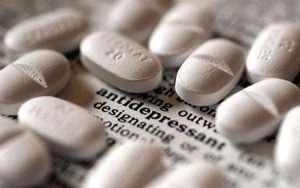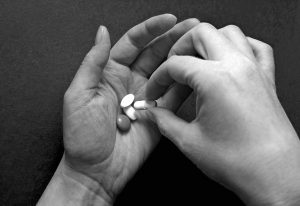Stuck in a negative network, changing thoughts or actions is just plain hard.

“I cannot do what you suggest – I know it won’t work.”
That was Jon’s mantra as he sat in my office and said that he can never be happy. The one thing he wants – a wife and family – will never happen because fate has determined he is not going to achieve that goal. Yet most opportunities he gets to meet someone new, he believes will not work.
Why is he resisting meeting new people when someday one might be interested in him? His inability to move from one idea to another to create a change in thinking or in attitude is typical for depression. And, as in Jon’s case, it seems like it’s intentional. Or at least that’s what family and friends see when they tell their depressed loved ones to “Just do it!” It is easy to judge from the outside, but it is hard to see on the inside of a person with depression.
That stuckness is a feature of underlying neurobiology. All of us think in networks: when we start to think about a topic, we enter a network of related concepts that allows thinking to be efficient and helpful. Ideas are linked and things we need to know are easier to access when we enter a network of similar ideas, experiences, or emotions. That is why when people are trying to develop a creative solution to a problem, they brainstorm. That is, they utter or write every idea that pops into their minds about solving a problem – no matter how ridiculous it sounds on the surface – and do not assess the idea until they have a long list of options. Brainstorming is valuable because it helps us remove ourselves from the already framed network and helps create a new one.
That same efficient brain that networks and categorizes also causes a problem when depression hits. Entering a negative network that connects similar thoughts, experiences and emotions result in a depressed person linking negative networks. It promotes the discouraged outlook that is typical of depression. And, unfortunately, in depression, the ability to move to another more positive network is impaired. The weakened activity of the neurotransmitters causes “stuckness” in the pathway in the brain that allows shifting of thought and emotion.
That pathway includes a part of the brain called the anterior cingulate cortex (ACC) that should allow for rapid shifting between emotion and thinking and should aid in developing creative problem-solving. But when people suffer depression, this pathway of the brain is impaired. It may be overactive – spinning in place without creating movement. Or it may be sluggish and unable pass along cognitive decisions like, “I will try something new,” to the emotional part of the brain that generates the discouraged, “I never have good results.”
Emotion rules when there is depression. The negative “It won’t work for me,” style of thinking seems to have more power than the optimistic, “Just give it a try,” method of thinking.
Sitting with Jon, I want to say, “Just do what I am suggesting!” I want him to borrow my ability to generate a new idea, but some things have to change before he can try something new. He cannot respond to “just do it” while his negative networking is making him believe that his case is different. His notions about how to act are the ones in the network of what he has typically done, which is a very negative network.
How can he get out of this?
He needs a MAP.
When you use a map – even your navigator – you have to know where you are starting and where you are going. Jon needs to know he is currently stuck and that another way just might be possible. But where is he going? He needs to believe in a reasonable solution. In our conversations, Jon is beginning to believe that his depressed thinking is a problem.
M – (You may want to consider medication as the first M and then go to this one)
Jon needs to move. Literally, move his body. The stuck brain finds it easier to shift gears when the physical body is moving. Walking, swimming, bike riding can all be good. Try movement without earbuds pumping music. The creative brain will take over and just might jump the tracks of negativity while you move. And vigorous exercise has a way of pumping up energy that lightens depression.
A – Ask for input. When we brainstorm it works better if we have more than one person adding ideas. We spur each other into different networks. Jon might benefit if he shares his challenge of being stuck with a friend or three. And it will be good for him to ask people what gives them happiness or satisfaction. He might hear that there are many ways to be content.
P – Play around with different options. Jon does not have to commit to an idea of what is fun or pleasurable or satisfying. He would benefit from playing with the children in his life whose joy is infectious. Play sports or games. Playing stimulates different networks and may result in some changes in his mood or thoughts that may help him be less depressed.
There is a saying that life is a journey, not a destination. I do not know Jon’s ultimate destination, nor does he. The outcome of this MAP will help him find a better, more creative, and less depressed way of living his life.
By Margaret Wehrenberg, Psy.D. Margaret is the author of 5 books published by W.W. Norton, includingThe 10 Best Ever Anxiety ManagementTechniques, The 10 Best Ever Depression Management Techniques and her most recent 10 Best Anxiety Busters, an ideal book for the general public. She earned her M.A. studying psychodrama and bioenergetics, and had years of experience as a certified drug and alcoholism counselor, before earning her Psy.D. She now specializes in treating anxiety and depression and has a private practice in Naperville, IL. She is a frequent contributor of articles to The Psychotherapy Networker magazine, has contributed a chapter to Clinical Pearls of Wisdom (Ed. M. Kerman), and has produced CD for breathing, muscle relaxation and imagery for anxiety management.
This article originally appeared in Psychology Today magazine.











